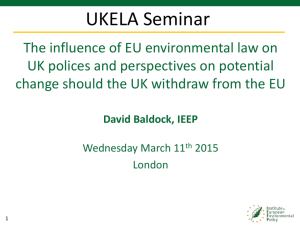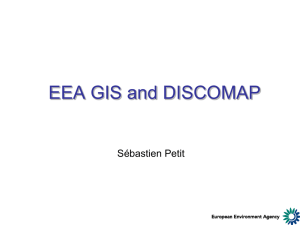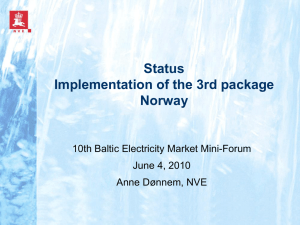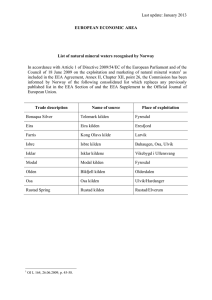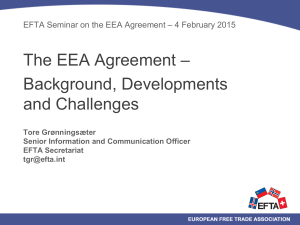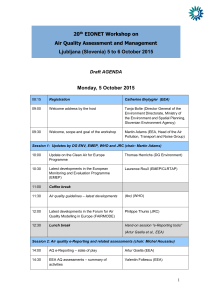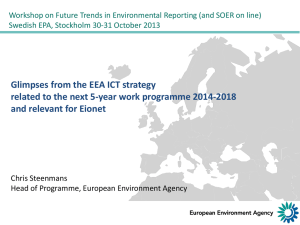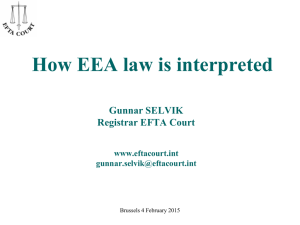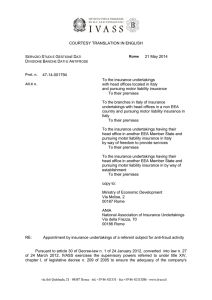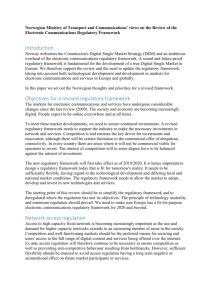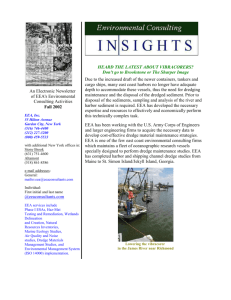PowerPoint-presentasjon
advertisement
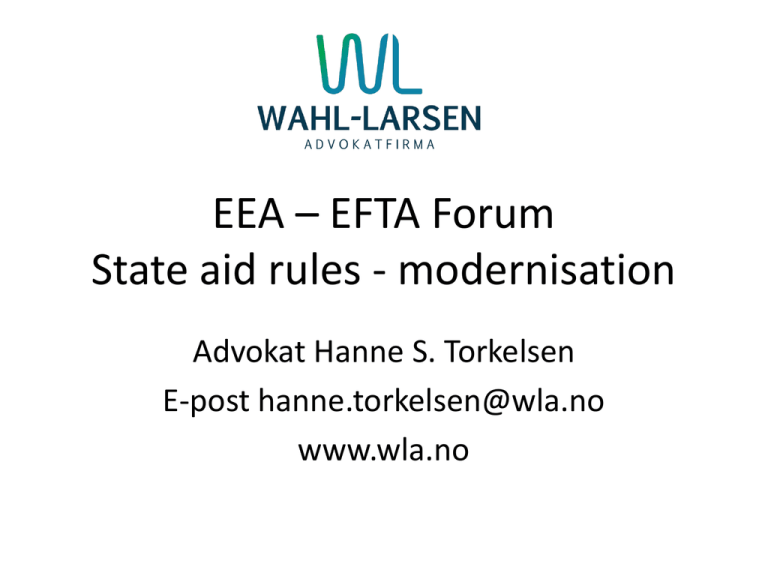
EEA – EFTA Forum State aid rules - modernisation Advokat Hanne S. Torkelsen E-post hanne.torkelsen@wla.no www.wla.no The objective of state aid legislation • To ensure that government interventions do not distort competition and trade inside the EU/EEA. State aid is accepted to achieve certain objectives, i.a.: • • • • Research and development Environment Risk capital Infrastructure (i.e. broadband) State aid legislation • • • • • EEA agreement - Article 61 (TFEU Art 107) Secondary legislation (directives and regulations) Commission Decisions (i.e.re public service compensation granted to undertakings entrusted with operation of services of general economic interest) Commission Guidelines ESA and the EEA Joint committee adopt legislative measures for State aid rules which are identical to that of the European Commission Enforcement in the EEA EFTA Surveillance Authority (ESA): • investigates allegations re illegal State Aid • approves new aid schemes and individual aid • decide that the State concerned shall abolish or alter such aid within a period of time to be determined by ESA If a member state does not comply with the decision within the prescribed time, ESA or any other interested State may refer the matter to the Court of Justice direct. Enforcement in the EEA, cont Decisions by EFTA Court and the European Court of Justice are very important – ESA decisions may be reversed by the EFTA Court ODA protocol 3 – On application by an EFTA state , The EFTA States can unanimously decide that aid given or planned aid is compatible with EEA article 61 if justified by exceptional circumstances (before the Authority has made its decision). State aid - EEA Art 61(1) «[s]ave as otherwise provided in this Agreement, any aid granted by EC Member States, EFTA States or through State resources in any form whatsoever which distorts or threatens to distort competition by favouring certain undertakings or the production of certain goods shall, in so far as it affects trade between Contrating parties, be incompatible with the functioning of this Agreement» State aid – EEA Art 61(1) 1. 2. 3. 4. 5. The measure involves an economic advantage Granted by State resources: public funds To «undertakings» - (not individuals or households) engaged in economic activity, irrespective of its legal status and the way in which it is financed Aid is selective – it favours only certain undertakings or production of certain goods The aid affects competition and trade within the EEA Cumulative criteria Art 61(2) and (3): Exception Art. 61 (2) Shall be compatible with EEA Agreement: • • Aid to individuals Natural disasters; exceptional occurrences Art 61 (3). May be compatible with the EEA agreement: • • • • • Underdevelopment European projects, serious disturbance Certain economic activities or areas Culture & heritage other Exemption from state aid • EC Court decision: «Altmark criteria» and EC Regulation for compensation for services of general economic interest • Regulation regarding «De Minimis aid» (200 000 Euro over 3 years) may be granted without notification • Aid covered by group excemptions and guidelines (horizontal or sectoral) and hence is considered legal (for instance regional investment aid) EEA art 59. no 2 - SGEI Undertakings entrusted with the operation of services of general economic interest or having the character of a revenue-producing monopoly shall be subject to the rules contained in the Treaties, in particular to the rules on competition, in so far as the application of such rules does not obstruct the performance, in law or in fact, of the particular tasks assigned to them. The development of trade must not be affected to such an extent as would be contrary to the interests of the Union. Existing or new aid - recovery Illegal state aid must be recovered with interest (up to 10 years!) Existing Aid = aid existing before the entry in force of the EEA agreement – must not be recovered – only aid granted after the decision regarding illegal aid is made by ESA System of state aid control No State Aid Art. 61(1) Case closed Yes Exceptions applicable? - De minimis aid - Block Excemptions - Guidelines - Art 59.2 No Existing Aid? No Recovery Ongoing modernisation Aim to reduce overall state aid and to increase «horizontal objectives» such as research and development, environment, risk capital Commission proposal – «de minimis» aid: To keep the current treshold value at 200 000 Euro Establish a national registry for de minimis aid – within 1.1.2016 - to increase surveillance and control Establish yearly reporting system (register) to monitor aid Ongoing modernisation - - New «de minimis aid» in force: Aid granted to undertakings providing a service of general economic interest provided that the total amount of aid does not exceed EUR 500 000 over any period of three fiscal years. This also apply to the «road passenger transport sector» Ongoing modernisation The general block exemption regulation, inter alia: • SME aid: risk finance measures will be revised and a broad category of start-up aid established • Research and Development: definitions are improved, reasearch infrastructures are introduced and broader innovation aid for SME • Category of Training Aid is established Ongoing modernisation • Definition of disadvantaged workers enlarged to include young people • Aid for environmental protection New block exemption for district heating ESA case 69911 – financing of municipal waste collectors Measure assessed in the decision: • The waste collection fee charged by municipality to its inhabitants to finance costs (household waste) – to avoid possible cross-subsidies • The income tax exemption for municipal waste collectors that are part of the legal person of the municipality The Authority has proposed to the Norwegian Government as an appropriate measure: Financing of municipal waste collectors, cont. - To organise internal accounts in the way that they show separately the costs and revenues associated with the non-economic activities and those of economic activities - The Norwegian authorities should ensure that the waste collection fee will be calculated on the basis of the costs directly related to non-economic activity as well as a proportionate share of fixed common cost Financing of municipal waste collectors, cont. - What is «a proportionate share of fixed commn cost» ? - the principle of «full cost» (incl. capital cost) or principle of «incremental cost/marginal cost»? - Regulation will affect the municipal waste incinerators ability to offer services in a market, and utilize the free capacity - In the case of municipal waste incinerators, capital costs are high, and the price including full capital cost might be higher then the market price for industrial waste Financing of municipal waste collectors, cont - To abolish the tax excemption, in so far as it applied to the economic activities of the municipal waste collectors Case regarding laboratories - - The municipalities of Trondheim has been operating a laboratory for more than 100 years in order to carry out the task for verifying the quality of drinking water and foodstuffs In 2004 the Norwegian Food Safety Authority was established, which immediately delegated some of its repsonsibilities back to the Municipality of Trondheim (Analysis Center) Case regarding laboratories - There is a market for laboratory services, and it is a sector subject to competition between commercial providers - The Analysis Center provides inhouse services to the municipality, but also provides laboratory services to third parties. Case regarding laboratories ESA considered the following as an advantage: - The municipality of Trondheim provides a number of collective services for free or at least at a price below market price - Budget transfer to be used for upgrading the building and equipment - Tax excemption for municipalities Case regarding laboratories - Proposed measure: - - To keep separate accounts for noneconomic and economic activites To ensure that accounts contain the direct cost of the economic activities and a contribution to the indirect costs common to both economic and non-economic activities Case regarding laboratories - Proposed measure: - - To demonstrate that the distribution of common costs allocated to economic/non-economic activites is appropriate (i.e. use of premises, collective services etc at market prices) To ensure that the Analysis Center are subjected to business taxes Thank you for your attention! E-mail: hanne.torkelsen@wla.no www.wla.no
